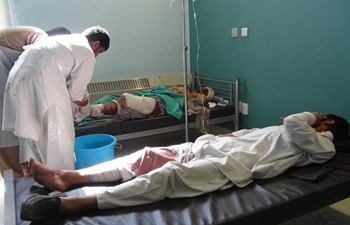LHASA, Oct. 17 (Xinhua) -- From a shepherd to the chairman of a construction company in southwest China's Tibet Autonomous Region, 61-year-old Penjolondru spent more than 40 years lifting himself put of poverty to become a household name in his hometown.
Penjolondru was born in 1956 to a poverty-stricken family in Nakartse County in Lhasa, where he started to help his father graze sheep and cattle while he attended primary school.
In 1981, Penjolondru decided to leave his hometown and work as a carpenter apprentice at a house building company in Lhasa. After years of study, in 1989 Penjolondru started up his own business and established a house construction company with 19 colleagues.
Since 1992, Tibet has seen a rapid economic growth with a double-digit growth rate. Local authorities poured investment into the region's facilities and schools construction as well as conservation of historic buildings each year.
Penjolondru remembers opportunities being everywhere in Lhasa at that time, and his company expanded fast. Nowadays, his company has 27 construction teams across Tibet and has employed nearly 15,000 people.
Although Penjolondru's life has vastly improved since his humble beginnings, his hometown is still stricken by poverty.
Located at about 4,500 meters above the sea level, Lhunposhol Village in Nakartse has a population of 6,640, 25 percent of whom live in poverty. There is little arable land and villagers depend on livestock raising for living.
After Chinese central authorities in 2015 made a promise to lift the remaining 55 million rural poor out of poverty by 2020, large-scale poverty relief programs have been launched across the country.
In Tibet, about 470 local companies participated in the region's poverty alleviation work to help lift 690,000 people out of poverty by 2020. In 2016, Penjolondru also signed an agreement with Lhunposhol to lift1,700 villagers out of poverty.
In 2016, his construction company hired 109 impoverished people from Lhunposhol and paid each person an annual salary of 22,000 yuan (more than 3,300 U.S. dollars).
In the same year, Penjolondru invested over two million yuan into the construction of a weaving factory in the village and will purchase all products at a market price from local weavers.
In Lhunposhol, women used to make pulu, a traditional Tibetan wool textile, but due to the lack of a proper market, fewer of them were engaged in the traditional craft, which faced the danger of being lost.
The factory now employs 216 women. By working in the factory during the slow season, and at home during the busy season, these weavers' monthly income increased to 3,000 yuan on average. The factory has also set up a training center to help more impoverished women master the weaving skill.
"My families used to depend on the living subsidiaries from local government. We never thought about finding a job," said Metog, who received training classes in the center last year.
She bought a weaver machine later and weaves pulu in the night whenever she is free, earning 2,000 yuan in the first two months.
Penjolondru believes education can change people's fate. In 2016, he set up an education fund to help poverty-stricken students in the village.
On October 9, several days before China's National Poverty Alleviation Day on Oct. 17, Penjolondru was awarded a prize in Beijing for his contribution to local poverty-relief work.
"I have benefited a lot from Tibet's economic growth in the past years. It is my turn to give back to my hometown," said Penjolondru.

















